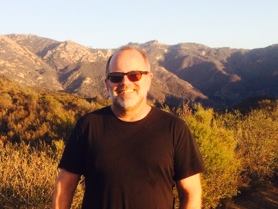
Travel and ecology writer Peter Fish will be the 2018-2019 Rachel Rivers-Coffey Distinguished Professor.
Currently a freelance writer and editor, Peter Fish for more than 30 years wrote and edited for Sunset Magazine, the 118-year-old magazine of the American West, where he focused on travel and environmental coverage. Most recently his writing has appeared in The San Francisco Chronicle and AFAR magazine. His article on the reintroduction of wolves to Yellowstone National Park, “Howl,” won a 2013 Lowell Thomas Award gold medal for environmental journalism. He annually serves on the jury of the Commonwealth Club's California Book Awards. His own anthology of California literature, California’s Best: Two Centuries of Great Writing from the Golden State, was published by Farcountry Press in 2010. He received a B.A. in History from Yale University and an M.A. in Creative Writing from Stanford University; in addition, he spent a year as a Hoyns Fellow in fiction at the University of Virginia’s MFA program. Raised in southern California, he lives in San Francisco with his wife and son. He read in the 2015-16 Hughlene Bostian Frank Visiting Writers Series.
Peter Fish's reading will be Thursday, October 4, 2018.
The Fall 2018 Rivers-Coffey Colloquium
Writing the Globe: Travel and Environmental Writing in the 21st Century
It’s a big world out there, waiting for writers to do it justice. This course will explore two related literary genres that traverse, explain, celebrate and on occasion condemn the world in all its complexities: the travel essay and the environmental essay. At their best, both do what all good literature does: delight, surprise, inform, challenge and move. Both are hybrid genres that require hybrid skills. Like any good fiction writer, travel and environmental writers need to know how to shape a scene, bring characters alive on a page, and make readers feel the emotions the writer feels. Like any good non-fiction writer, travel and environmental writers need to be astute reporters, skillful interviewers, empathetic listeners, and have a healthy regard for facts. To that second list the environmental writer in particular needs to add the gift of taking complex scientific and technical information and making it clear and compelling to the non-expert reader. In this course we’ll be reading, analyzing, and drawing lessons from notable, mostly contemporary and mostly American travel writers (among them, Joan Didion, David Foster Wallace, Colson Whitehead, and Ian Frazier) and from environmental writers (among them, Elizabeth Kolbert and Jon Mooallem). We’ll also be writing, workshopping and rewriting: short pieces and one full-length, reported travel story.